On Monday afternoon, Twitter announced that it has entered into a definitive agreement to be acquired by Elon Musk, for $US54.20 (A$75.60) per share in cash in a transaction valued at about $US44 (A$61.4) billion. This means that once the transaction is complete, Twitter will become a privately held company.
Musk’s acquisition means the company will likely no longer be governed by its existing board and will no longer be publicly traded. “Twitter needs to be transformed as a private company,” Musk previously said in an SEC filing.
The purchase follows weeks of posturing by Musk and back-and-forth conversations between the billionaire and the Twitter board.
Why did Elon Musk buy Twitter?
On March 25, Musk tweeted that “free speech is essential to a functioning democracy,” along with a yes/no poll asking his followers if they “believe Twitter rigorously adheres to this principle.” In a second Tweet, he hinted at big intentions and stated, “the consequences of this poll will be important. Please vote carefully.” With more than 2 million votes, the final poll result was 70.4% “No” to 29.6% “Yes.”

A day later, in two more tweets, Musk said, “given that Twitter serves as the de facto public town square, failing to adhere to free speech principles fundamentally undermines democracy. What should be done?” and “Is a new platform needed?”
(It’s important to point out here that Twitter actually has notably lax content moderation compared to other social media platforms. And that even less oversight could lead the site to become even more of a hub for disinformation and bot-manufactured extremist movements.)
On April 4, the world’s most terminally online billionaire announced that he had purchased 9.2% of Twitter’s stock shares, becoming the single largest stakeholder in the company. He also further tweeted out another yes/no poll on the same day, asking followers, “do you want an edit button?” Though Musk actually purchased the stock on March 24, he didn’t file the required SEC paperwork declaring the acquisition until 10 days later.
The next day, April 5, Twitter CEO Parag Agrawal announced that Musk would be appointed to the social media company’s board of directors. Backlash from Twitter employees as well as lots of other people on the internet prompted the platform to host an AMA (ask me anything) with the South African, Apartheid-era, emerald heir. And, just days later, on April 11, the deal fell through. Musk ended up not joining Twitter’s board, probably after learning that becoming a board member would prevent him from acquiring more than a 14.9% stake in the company.
Once it became clear the Dogecoin pioneer would no longer become a Twitter board member, Agrawal said, “I believe this is for the best,” in a statement directed to the rest of the board. Plus, Twitter investor Marc Rasella filed a lawsuit against Musk on April 12 for failure to disclose his 9.2% purchase quickly enough.
Then, on April 13, Musk filed paperwork with the SEC declaring his intention to buy 100% of Twitter at $US52.40 ($73) per share in cash. He threatened that if his offer was not accepted, he would offload all of his 9.2% stake, effectively crashing the company’s stock. “My offer is my best and final offer and if it is not accepted, I would need to reconsider my position as a shareholder,” he said in Exhibit B of the SEC filing.“Twitter has extraordinary potential. I will unlock it,” he ominously added.
Following that announcement, Twitter’s board instituted a “poison pill” rights plan on April 15. The plan made it so that, if any one person were to acquire 15% or more of the company, other shareholders could then buy additional stock at a discount. Effectively, this meant Grimes’ on-and-off-again boyfriend couldn’t just outright buy all of Twitter without at least talking with the board first.
But nonetheless, Musk persisted. Twitter’s board entered negotiations with the tech genius that brought us “Cybertruck” and innumerable other classics, on April 24. Between the announcement of those talks and Musk’s final purchase of the social media site, Dogecoin value rose by almost 9% and the stock tied to Former President Donald Trump’s social media venture, Truth, tanked by more than 5%. Trump founded the sparsely used platform after he was permanently banned from Twitter. And, if Twitter un-does bans like his, there will be even less of a reason for “Truth” to exist.
Although the edit button tweet and Musk’s emphasis on unmoderated “free speech” hint at his ideal Twitter-verse, it’s unknown exactly how the platform might change under his tutelage. As of writing, neither Twitter nor Musk have responded to Gizmodo’s request for comment.
However, around noon on Monday, Musk tweeted, “I hope that even. my worst critics remain on Twitter because that is what free speech means.” Which, to be clear, is not what the First Amendment right to freedom of speech means. Nobody in the U.S. has a constitutional right to tweet or otherwise post on private social media platforms.
Musk is in good company with his misunderstanding. Florida Governor, Ron DeSantis, also doesn’t seem to grasp the definition of free speech. On Monday, he tweeted out, “@elonmusk’s offer to buy Twitter is a good deal for shareholders and raises the prospect that the platform will be a place where free speech can thrive, not a tool for narrative enforcement.”
